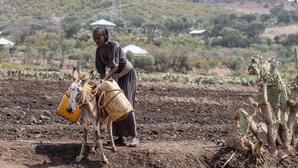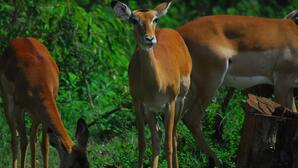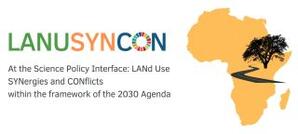Research topics
The project LANUSYNCON covers different research topics namely agriculture, biodiversity and ecosystem services, climate change, health, gender, and science policy interfaces.
Agriculture

Unlike any other region of the world, Sub-Sahara Africa is suffering from malnutrition and an increasing pressure on land to produce as much food as possible. At the same time, agricultural products should be produced as sustainable as possible and without heavy use of pesticides, which have led to a sharp decline in insects. Agriculture has the potential to create trade-offs as well as synergies between SDGs, such as in the context of the action of securing food production (SDG2) and biodiversity protection (SDG15). In our research, we focus on these synergies and conflicts moderated by different agricultural practices and contextual factors such as climatic, ecological and socioeconomic variables.
Master and doctoral research on agriculture:
- Agricultural practice options for synergies between food production and biodiversity conservation in Kenya by Hannah Kamau
- Mapping the suitability of bio-economic innovations in Vietnam’s agricultural sector by Uyen Tran
- Measuring bioeconomy's contributions to the Sustainable Development Goals achievement in Brazil by Fernanda Martinelli
- Optimizing Conservation and Livelihood Development: A Case Study of Igando-Igawa Wildlife Corridor in Tanzania by Qambemeda Masala Nyanghura
- Uncertainties in the effectiveness of biological control of stem borers under different climate change scenarios in Eastern Africa by Ines Jendritzki
Biodiversity and ecosystem services

The conservation of biodiversity and ecosystem services, the main target of SDG 14 and SDG 15 (Live on Land and under Water), is interlinked with multiple other SDGs. While biodiversity is the basis for the provisioning of ecosystem services, multiple trade-offs become apparent when it comes to preserving biodiversity and fostering economic development. Biodiversity conservation is directly and indirectly linked to other SDGs such as climate change mitigation and adaptation (SDG13), the promotion of an inclusive economy (SDG8) or the development of infrastructure (SDG9). In LANUSYNCON we assess these interlinkages and emerging conflicts and synergies resulting from the conservation of biodiversity and ecosystem services. To this end, we explore various scenarios of land use considering the perspectives of different stakeholders.
To contribute to sustainable development, research on biodiversity and ecosystem services:
- Optimizing Conservation and Livelihood Development: A Case Study of Igando-Igawa Wildlife Corridor in Tanzania by Qambemeda Masala Nyanghura
- Participatory approaches to valuing and modelling forest ecosystem services in Sudan by Fatima Ali
- Synergies and tradeoffs between road development, livelihood and biodiversity conservation in the Greater Serengeti Ecosystem by Philipo Jacob
Climate Change

Target 13.1 SDG13 (Climate Action) to strengthening the resilience and adaptive capacity to climate-related hazards and natural disasters is closely related to the work of Lanusyncon’s research project, particularly in examining the cause of land-use conflict, the loss of biodiversity and land degradation. Special IPCCC report on land and climate changed stated that “land degradation and climate change act as threat multipliers for already precarious livelihoods (very high confidence), leaving them highly sensitive to extreme climatic events, with consequences such as poverty and food insecurity (high confidence) and, in some cases, migration, conflict and loss of cultural heritage (low confidence)”. Lanusyncon objective to provide a coherence land-use policy is indeed supporting Target 13.2 SDG13 to integrate climate change measures into national policies, strategies and planning.
Research related to climate change:
- Measuring bioeconomy's contributions to the Sustainable Development Goals achievement in Brazil by Fernanda Martinelli
- Uncertainties in the effectiveness of biological control of stem borers under different climate change scenarios in Eastern Africa by Ines Jendritzki
Health

The concept of One Health and Planetary Health have been suggested as a framework to link multiple dimensions of health including the functionality of ecosystems and wellbeing humans. For example, the emergence of zoonotic diseases has been linked to environmental changes, such as biodiversity loss, land use and socioeconomic change. In LANUSYNCON, we assess how land use change is affecting multiple health dimensions and how science policy interfaces can support decision making and land use management for planetary health.
Research related to health:
- Analysing the Legitimacy of Science Policy Interfaces in the Environmental Health Context by Niklas Wagner
- Model and map dynamics of Lands, in terms of Biodiversity, climate change, and ecosystems services supply-demand scenarios by Mahmoud Nady
Gender

Gender aspects and land use are directly and indirectly linked, for example through gender differences in land tenure and women’s significant role as land-use scientists as well as practitioners. In LANUSYNCON, we embrace gender perspectives in research and promote gender equality in our team.
Publications relate to gender :
- A dichotomy of domestic and academic pathways: gender (in)equality among doctoral candidates in land science by Sara Velander, Dewi Idam Sari, Fatima Ali, Fernanda Martinelli, Lisa Biber-Freudenberger
- A long way to go: Gender and diversity in Land use science by Hannah Kamau, Uyen Tran, Lisa Biber-Freudenberger
Science-Policy

Political land use decisions play a key role, particularly in the prevention of conflicts and utilization of synergies between different SDGs. Science Policy Interfaces (SPIs) are increasingly being established to translate scientific findings into relevant options for action for political decision-makers. Therefore, in LANUSYNCON we assess how conflicts and synergies between SDGs are addressed in international and national SPIs in order to identify factors and obstacles to coherent land use in the development policy context. The influence of SPIs on national policy discourses as well as the resulting land use conflicts on the ground are examined more closely using the local case studies.
Research related to Science Policy:
- Analysing the Legitimacy of Science Policy Interfaces in the Environmental Health Context by Niklas Wagner
- Cooperative Pathways for Coherent Land Use Decisions: Untangling and Embracing Complexity in Science-Policy Interfaces by Sara Velander




